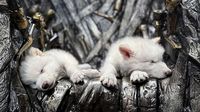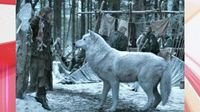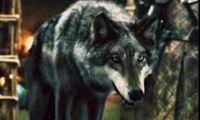In a groundbreaking announcement, Colossal Biosciences Inc., a Dallas-based biotech company valued at $10 billion, has successfully revived the dire wolf, a species that has been extinct for over 10,000 years. This remarkable feat, which took place on Monday, April 7, 2025, is being hailed as the first case of animal de-extinction in history.
The dire wolf, known scientifically as Canis dirus, was a prominent predator across North America during the Pleistocene epoch. Their extinction is believed to have resulted from climate changes and the decline of large herbivores that constituted their primary prey. The dire wolves gained renewed popularity through the HBO series Game of Thrones, where they were depicted as the noble companions of House Stark.
Colossal Biosciences made headlines in 2022 with its ambitious goal of resurrecting the woolly mammoth, and while that project is still underway, the company has now successfully created three dire wolf cubs named Remus, Romulus, and Khaleesi. The naming of the female cub, Khaleesi, pays homage to the character played by Emilia Clarke in the fantasy series.
The process of bringing these ancient creatures back involved extracting DNA from two fossils—one a 13,000-year-old tooth and the other a 72,000-year-old skull. The team then performed 20 edits to the genetic code of the gray wolf, which is the dire wolf's closest living relative. CEO Ben Lamm remarked, "Our team took DNA from a 13,000-year-old tooth and a 72,000-year-old skull and made healthy dire wolf pups. It has been said that 'any sufficiently advanced technology is indistinguishable from magic.' Today, our team is pleased to reveal part of the magic in which we are working and its broader impact on conservation."
The three cubs are currently residing in a natural reserve covering over 800 hectares at an undisclosed location in the United States. They are expected to weigh between 59 and 68 kilograms as adults, significantly larger than the average gray wolf, which typically weighs between 36 and 45 kilograms. Their diet consists of a mixture of beef, venison, and horse meat, supplemented by specially formulated feed designed to meet their nutritional needs.
The announcement was made with a touch of Hollywood flair, featuring notable figures like filmmaker Peter Jackson and Game of Thrones creator George R.R. Martin. Jackson, an investor in Colossal, lent the official Iron Throne, a prop weighing nearly 150 kilograms, for a promotional photo shoot featuring the cubs. Martin, who serves as a cultural consultant for the company, visited the cubs in their reserve and expressed his thoughts on their significance, stating, "Many people see dire wolves as mythical creatures that only exist in a fantasy world, but in reality, they have a rich history of contributing to the American ecosystem."
This project not only revives an iconic species but also serves as a testament to the advancements in genetic engineering and conservation efforts. Colossal Biosciences has also cloned litters of red wolves, the most critically endangered wolf species, as part of its broader mission to align conservation with de-extinction.
Founded in 2021, Colossal Biosciences aims to use biotechnology to restore ecosystems and bring back other extinct species, including the woolly mammoth, Tasmanian tiger, and dodo. The success with the dire wolf is seen as a proof of concept for their technology and a significant step towards restoring these creatures to their native habitats.
While the prospect of reintroducing dire wolves into the wild raises questions about ecological balance and the challenges of adapting these animals to modern ecosystems, the project offers a fascinating glimpse into the past. Observing the behavior and physiology of the cubs could provide valuable insights into the lives of their ancestors and the dynamics of prehistoric ecosystems.
As the cubs grow, researchers will monitor their development closely, hoping to learn more about their interactions and behaviors. The implications of this work extend beyond just the dire wolf; the techniques developed could be applied to protect and conserve endangered species today.
The dire wolf represents more than just a scientific achievement; it connects the realms of science and popular culture, capturing the imagination of people worldwide. The connection to Game of Thrones has sparked interest in the project, highlighting the potential for biotechnology to revive not only species but also the stories and myths that accompany them.
In summary, the revival of the dire wolf by Colossal Biosciences marks a significant milestone in the field of genetic engineering and conservation. As the world watches the progress of Romulus, Remus, and Khaleesi, this endeavor underscores the potential of science to reshape our understanding of history and biodiversity. The future of de-extinction is just beginning, and these cubs are the pioneers of a new chapter in the ongoing story of life on Earth.





